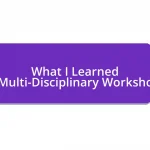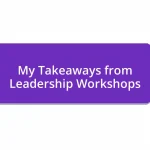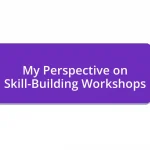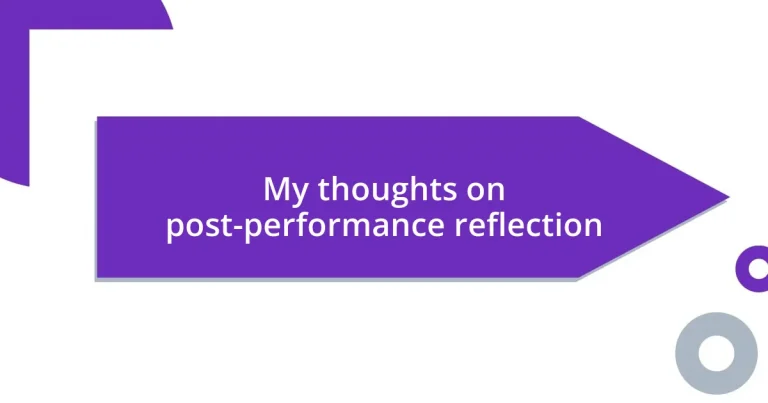Key takeaways:
- Post-performance reflection fosters personal growth by transforming mistakes into learning opportunities and enhancing self-awareness.
- Effective techniques for reflection include setting aside dedicated time, structured questioning, and incorporating peer feedback for richer insights.
- Incorporating feedback is crucial for improvement and can help pinpoint both weaknesses to address and strengths to build upon.
- Setting specific, measurable goals based on reflections ensures meaningful progress and aligns future performances with personal passions and emotions.
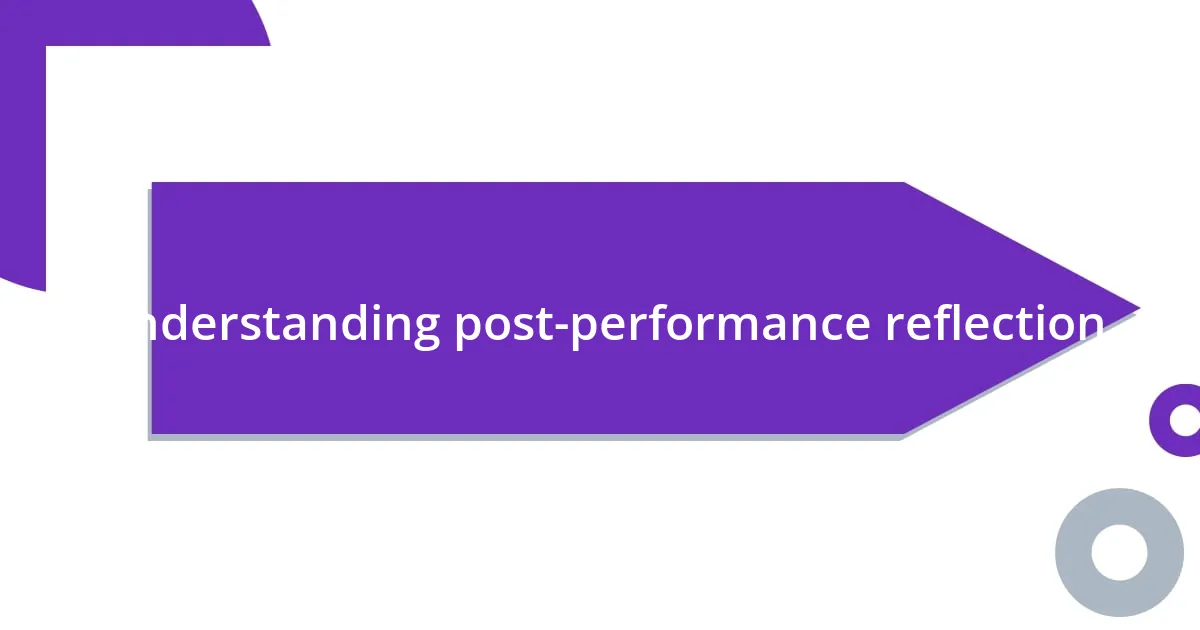
Understanding post-performance reflection
Post-performance reflection is a vital tool for anyone looking to grow and improve. I remember a particular dance recital where I felt I could have done better. After the performance, I took the time to jot down my thoughts. What went well? What didn’t? This type of reflection isn’t just about critiquing—it’s about understanding my emotional state during the performance.
Have you ever felt that rush of adrenaline and uncertainty on stage, followed by the quiet that comes once the spotlight fades? For me, that moment is when clarity hits. Reflecting on my experience, I realized I hadn’t fully engaged with the audience. This insight shifted my focus in subsequent performances. Rather than just executing the steps, I started to think about connecting with the people watching.
Through reflection, I’ve learned that it’s a process of discovery. Instead of feeling defeated by mistakes, I now view them as stepping stones to mastery. Each performance offers a chance to ask myself: How can I bring my best self forward next time? This ongoing dialogue with myself fosters a deeper understanding of my craft and, ultimately, leads to growth that extends beyond the stage.
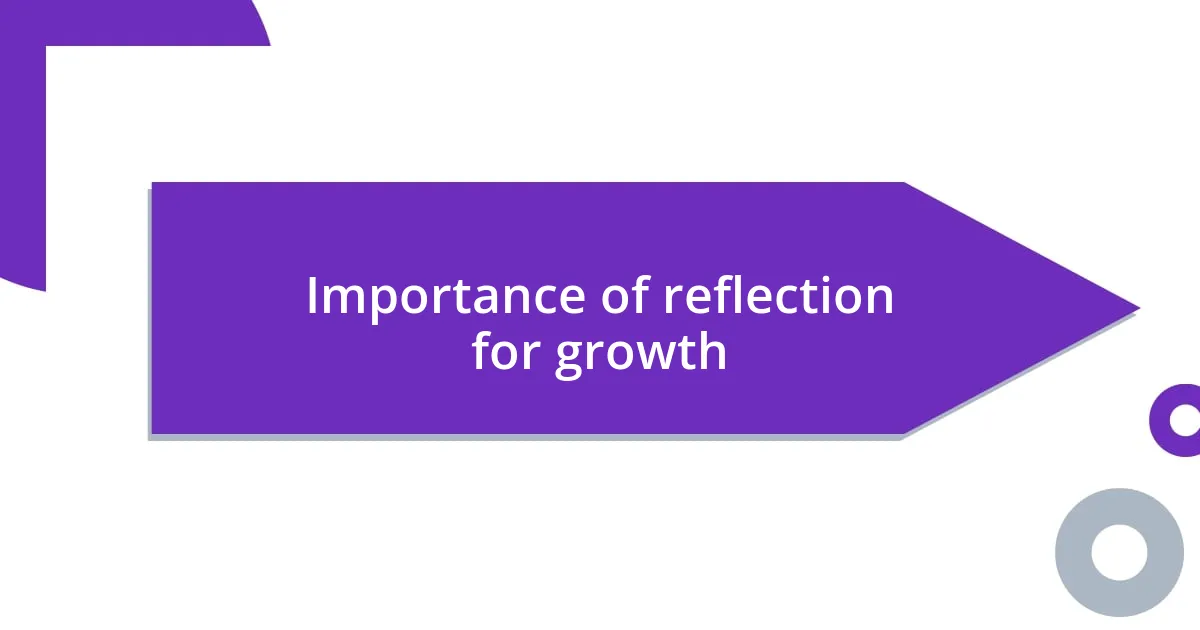
Importance of reflection for growth
Reflection isn’t just a passive activity; it’s an active pursuit of growth. I recall a time after an important presentation at work. I felt a mix of pride and anxiety. Rather than brushing my thoughts aside, I grabbed a notebook and wrote down all my feelings. What resonated with the audience? What didn’t land? This practice not only highlighted my strengths but also brought to light areas in dire need of improvement, sparking new intentions for future presentations.
Here are some reasons why reflection is crucial for growth:
- Enhanced Self-Awareness: Journaling my thoughts helps me identify patterns in my behavior and emotions, leading to deeper self-understanding.
- Identifying Strengths and Weaknesses: Reflection allows me to celebrate what worked and pinpoint what needs tweaking.
- Encourages a Growth Mindset: Instead of fearing failure, I’ve learned to embrace it as a learning opportunity—each reflection is a step forward.
- Building Resilience: Reflecting on setbacks has helped me become more adaptable and open to change, crucial for personal and professional growth.
- Goal Setting: After considering past performances, I can set specific, actionable goals for improvement in the future.
Embracing reflection has transformed my approach to challenges. Now, it feels like I’m continuously evolving, each experience enriching my journey.
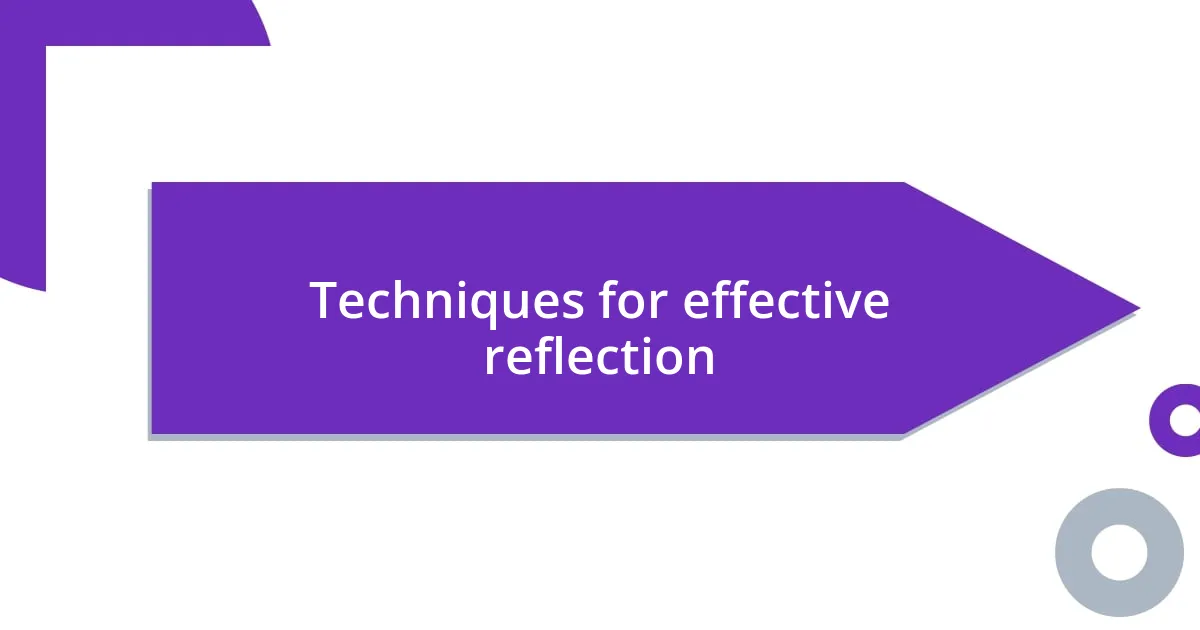
Techniques for effective reflection
When it comes to techniques for effective reflection, I’ve found that setting aside dedicated time is crucial. I usually schedule 10-15 minutes right after a performance, just to sit quietly and think. It’s amazing how much clearer my thoughts become in that space. During those moments, I allow emotions to flow and write what comes to mind without judgment, which often leads to surprising insights.
Another technique I swear by is structured questioning. I ask myself specific questions like, “What was the highlight of my performance?” or “What feelings did I experience during the most challenging moments?” This method prompts deeper reflection, guiding me away from surface-level observations. I recall a piano recital where my palms were sweating. Asking myself what caused that stress revealed my underlying fear of judgment, which I hadn’t recognized before. This kind of self-inquiry has shown me the emotional layers beneath my performance.
Peer feedback is another effective tool I embrace. After a recent group project, I gathered my teammates for an honest discussion about our performances. We each shared our strengths and areas of improvement, creating a supportive environment that felt constructive rather than critical. Their perspectives opened my eyes to things I had overlooked. This collaborative reflection often leads to richer insights and a more balanced view of my capabilities.
| Technique | Description |
|---|---|
| Dedicated Time | Setting aside specific time for reflection allows thoughts to crystallize and become clearer. |
| Structured Questioning | Asking specific questions prompts deeper reflection and reveals emotional layers. |
| Peer Feedback | Gathering feedback creates a supportive space for constructive insights from others. |
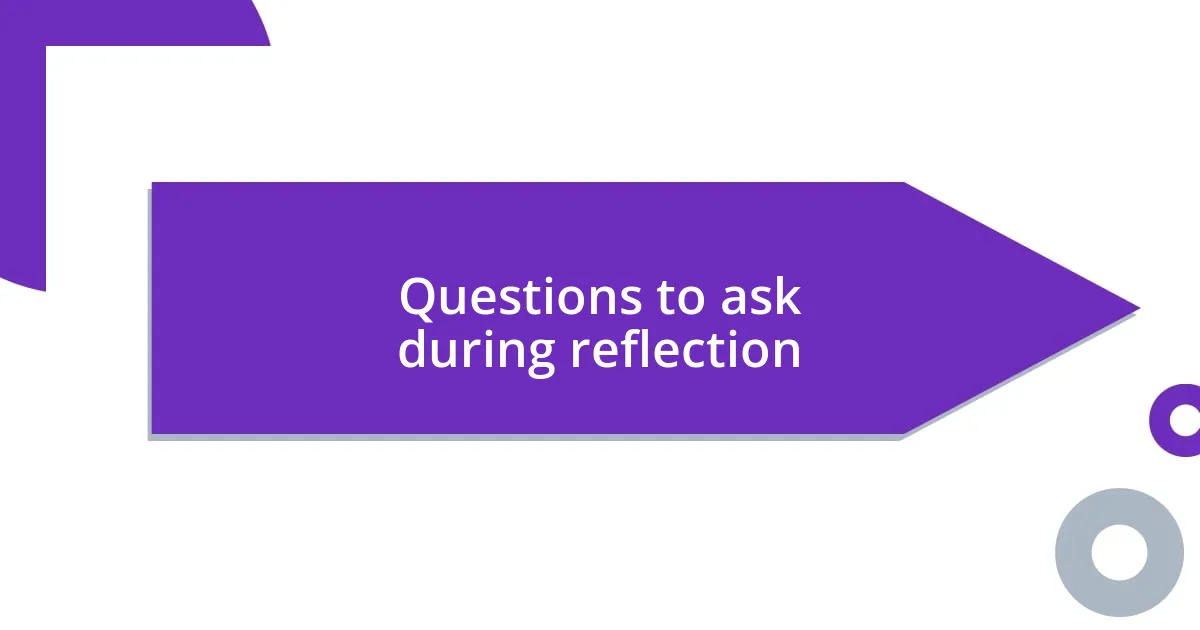
Questions to ask during reflection
What questions should you ask during your reflection? One question I often find beneficial is, “What did I learn about myself through this experience?” This inquiry allows me to delve into my emotional responses and uncover motivations I might not have recognized initially. For instance, after a challenging meeting, I realized my reluctance stemmed from a fear of being wrong, which became a powerful catalyst for change in my future contributions.
Another worthwhile question to ponder is, “How did my actions align with my goals?” Reflecting on this can be quite illuminating. I remember a time when I presented at a conference and felt disconnected from my main objectives. I asked myself why, and it helped me see I had strayed into unrelated content. Understanding this shaped how I prepared for future engagements, ensuring I remain focused on what truly matters.
Finally, consider asking, “What would I do differently next time?” This opens the door to innovation and self-improvement. After my last creative project, I was unhappy with my approach to collaboration. I noted that I held back too much. This simple reflection prompted me to be bolder in future projects, leading to richer ideas and a more engaged team dynamic. How might asking yourself this question change your approach to upcoming challenges?
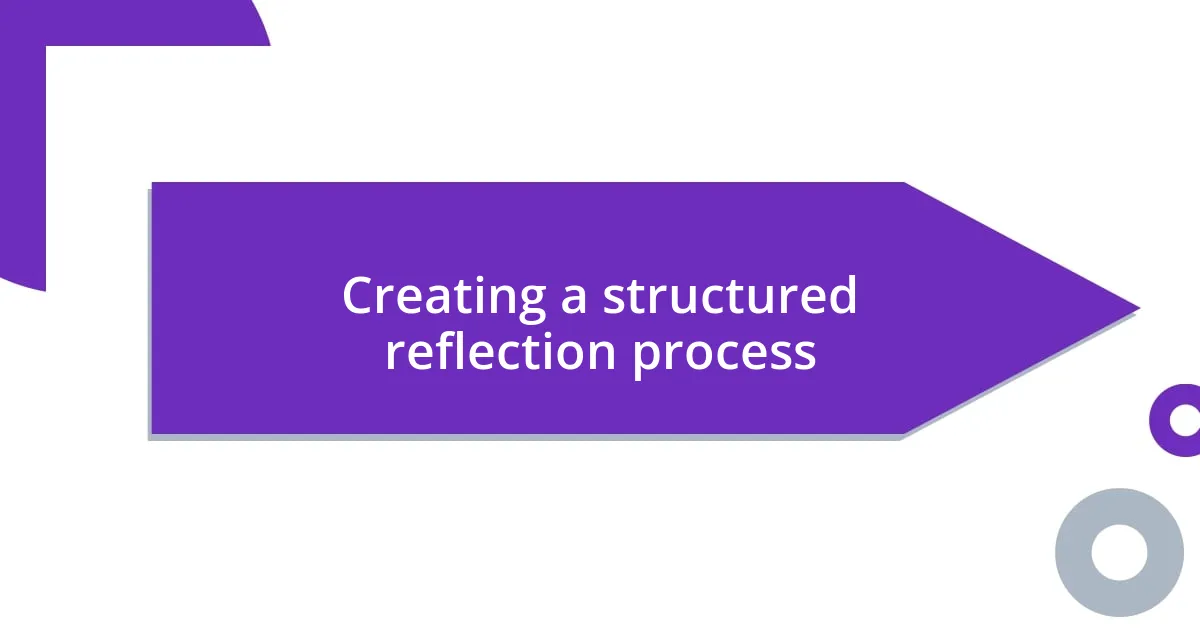
Creating a structured reflection process
Creating a structured reflection process can truly elevate your understanding of experiences and enhance future performances. I find that organizing my reflections into specific categories—like strengths, challenges, and insights—creates a clearer picture of what I’ve accomplished and where I can improve. For instance, after a workshop I led, I broke down my reflection into these sections, allowing me to celebrate my successes while pinpointing areas where I got a bit lost. This approach not only clarifies my thoughts but also emphasizes growth.
Another key element is to establish a consistent format for your reflections. I often create a simple template that includes sections for key learnings, emotional reactions, and action points. This ensures that I leave no stone unturned. There was a time during a difficult project when I felt overwhelmed; using this format helped me articulate my frustrations and identify practical steps to regain control. Isn’t it interesting how a structured approach can transform chaos into clarity?
Finally, incorporating visual elements can deepen the reflection process. I enjoy blending my notes with sketches or mind maps, which helps me visualize connections and feels more engaging. After a particularly intense performance, I doodled my emotional highs and lows alongside my notes, discovering patterns I hadn’t noticed before. What creative methods do you think could enhance your reflections? Exploring different formats like these can make the practice not only insightful but also enjoyable.
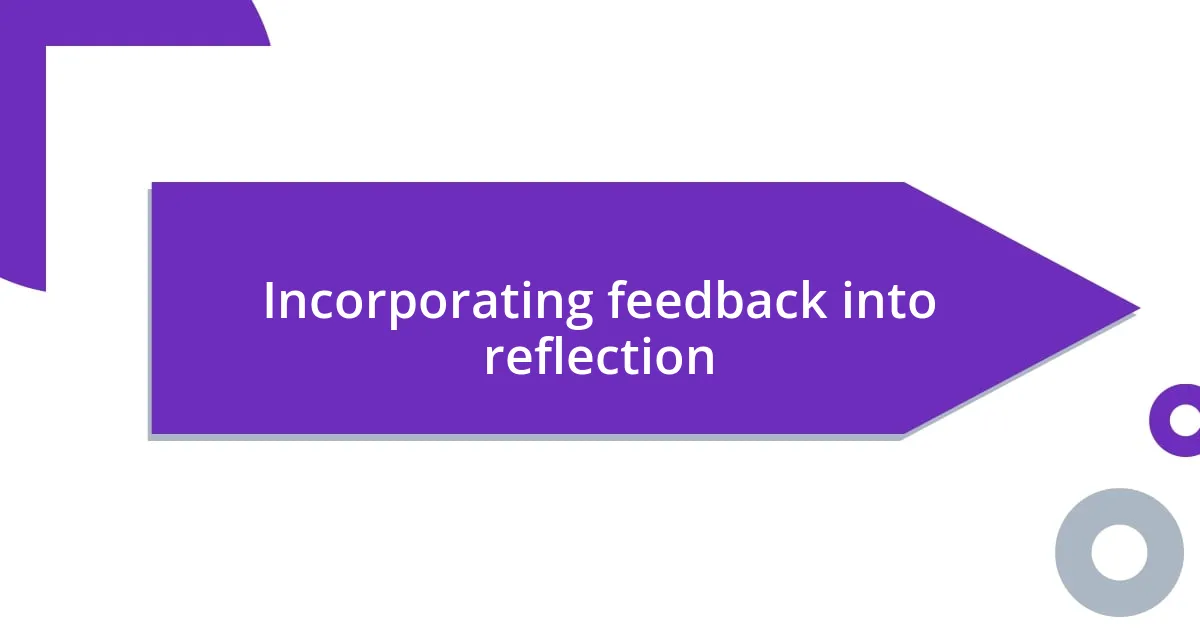
Incorporating feedback into reflection
Incorporating feedback into my reflection process has often proved to be a game changer. I recall after receiving feedback on a presentation, I felt initially defensive, but once I sat down to reflect, I recognized the value in those critiques. A simple note from a colleague pointed out that my introduction was too lengthy; reflecting on that not only improved my future presentations but also made me more open to constructive criticism. Have you ever noticed how feedback can highlight blind spots you weren’t aware of?
When I think about feedback, it’s essential to embrace it as a tool for growth rather than a personal attack. I remember a time when my mentor pointed out that I often rushed through complex ideas, leaving my audience confused. Initially, I felt disheartened, but reflecting on this allowed me to see how it affected my effectiveness. It became a pivotal moment for me, realizing that pacing myself could foster deeper understanding. How do you process feedback when it feels challenging?
Feedback isn’t only about fixing mistakes; it can also confirm what you’re doing right. After completing a project where I received glowing reviews for my collaboration skills, I reflected on what made that experience stand out. I realized that my willingness to listen and adapt was key, a revelation that boosted my confidence moving forward. Isn’t it empowering to recognize your strengths and find ways to build on them in your reflections? By weaving feedback into our self-assessment, we unlock a richer understanding of our journey.
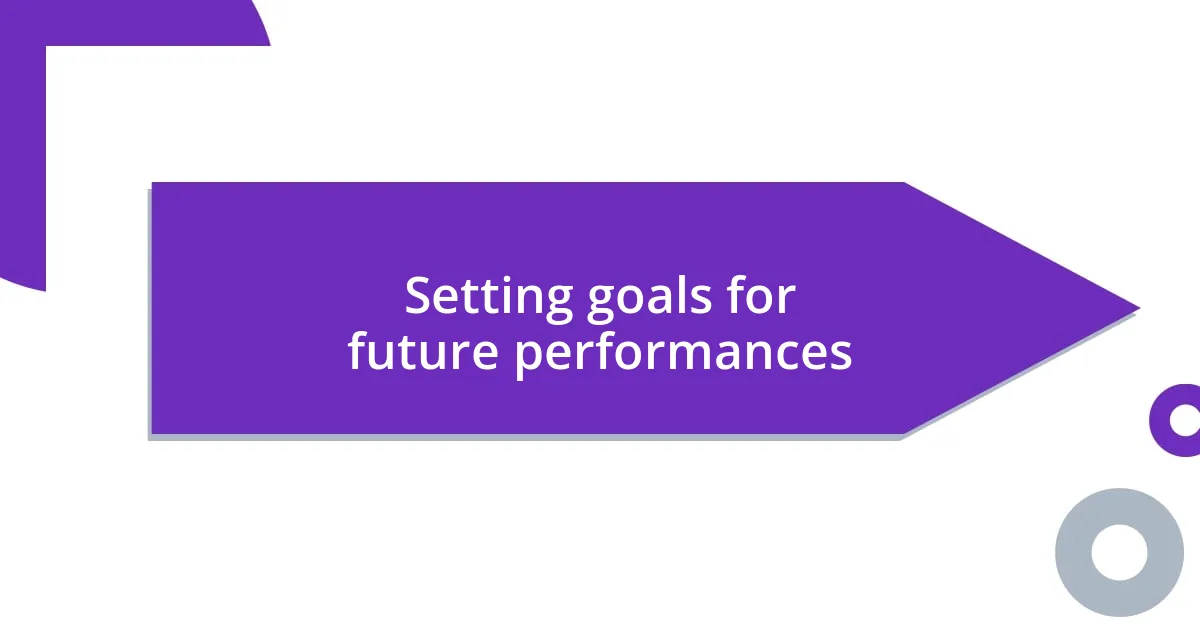
Setting goals for future performances
Setting goals for future performances is about envisioning where I want to improve and what I aspire to achieve. After a major presentation, I often take a moment to ask myself: what one specific skill do I want to refine next time? I remember deciding to work on my body language after feedback highlighted how effective it could make my message. This focused approach helps me direct my efforts meaningfully.
I also find it helpful to set measurable goals. For instance, after feeling that my last team meeting lost momentum, I resolved to engage the team with at least three interactive activities in our next session. I even wrote it down and placed it on my desk as a constant reminder. It’s fascinating how tangible goals can motivate me—they feel like a promise to myself to step up my game.
Reflecting on the emotional aspect of performance, I strive to set goals that resonate with my passions. After a show where I felt particularly vibrant, I aimed to enhance that energy in future performances. I realized that when I connect deeply with what I’m doing, not only do I perform better, but I also enjoy the process more. What joys can you integrate into your next goals? By aligning our aims with our emotions, we can elevate our performances significantly.
